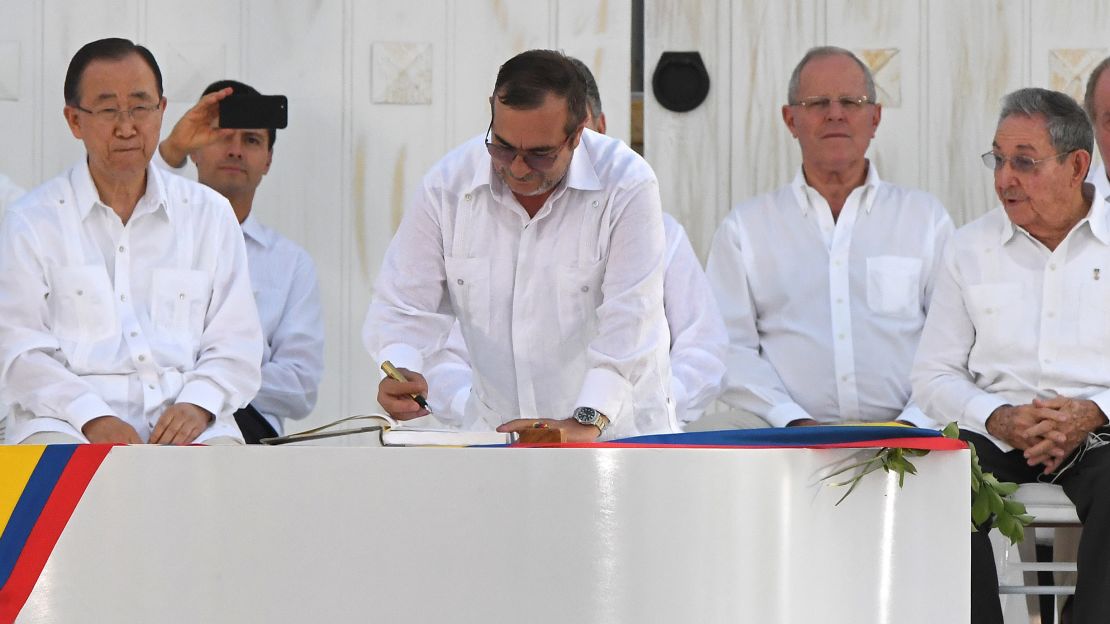Story highlights
Colombian rebel group signs deal to end over half a century of armed conflict
Deal still needs to be ratified by electorate in an October referendum
A conflict that lasted over five decades. An estimated 220,000 people killed. Five million displaced.
These staggering figures are now consigned to history as the Colombian government buries the hatchet with its longtime nemesis, the Marxist Revolutionary Armed Forces of Colombia rebel group, better known by its Spanish acronym, FARC.

In a symbolic gesture, the pens used to sign the historic peace deal, years in the making, have been made from recycled bullets once used in the conflict. An inscription on the side of the pens reads: “Bullets wrote our past. Education, our future.”
The two sides, joined by leaders from the United States, Mexico, El Salvador, Uruguay, Cuba and the United Nations, came together on Monday in the coastal colonial city of Cartagena to sign the accord.
“Today, Colombians are bidding farewell to decades of flames, and sending up a bright flare of hope that illuminates the entire world,” UN Secretary-General Ban Ki-moon said at the signing ceremony.
The rebels voted unanimously to approve a deal that was finalized in August to end the 52-year-old conflict, Latin America’s longest-running.
It still needs to be ratified by voters, who will consider the agreement in a single-issue referendum on October 2.
The treaty, signed by President Juan Manuel Santos and FARC leader Rodrigo Londoño, better known as Timochenko, requires rebels to give up their weapons and participate in a transitional justice process toward reintegration.
Opinion: United States should embrace a changing Latin America
New political era
If and when the deal is approved by the electorate, the FARC will cease to be a rebel group and instead enter into politics as a left-wing party.
The treaty grants the FARC 10 political seats, but it remains to be seen whether the rebel group, founded on Marxist ideologies of class struggle, can effectively transition into a political platform.
While the deal symbolizes a chance for future generations to come of age in peace, the deal also signals a new chapter for the region. The longest-running war in the Americas will finally be over, bringing an end to armed political conflict in Latin America.
However, not all groups are bound by the peace deal. The second most powerful group following the FARC, the National Liberation Army, or ELN, has announced interest in the peace deal but refused to end its practice of kidnapping.
Colombia’s FARC rebels release child soldiers

End of an era for armed conflict in Latin America
Latin America has slowly been freeing itself from the shadows of the Cold War as countries such as Colombia, Guatemala, Bolivia and Chile – with the help of the United States – fought off rebel guerillas.
US influence in Latin America
“Across the region, the Cold War is over,” said Cynthia Arnson, director of the Latin America Program at the Woodrow Wilson International Center for Scholars. Now, “Guerrilla war is no longer seen as a reasonable way to contest power.”
The FARC started in 1964 and, like its mentors in Cuba, was committed to redistributing the wealth, even if it meant by force.
But half a century later, now funded by a sophisticated cocaine trafficking network and armed with child soldiers, the rallying cries to protect an agrarian society begin to sound antiquated and obsolete.
According to Arnson, public approval for the FARC has never polled more than 5%.
War-weary, but still untrusting
For Jorge Bermudez, a retiree in Bogota, the peace deal is good in theory, but he remains wary.
“I don’t think the agreement will become a reality because dealing with people who have killed so many children, that have maimed people and suddenly they are in government … how will this country end up with such people?” he told CNN Español.
Salud Hernandez, who has been a correspondent in Colombia for the daily newspaper El Mundo since 1999, has reasons to have ill faith in the FARC. Hernandez has covered this war extensively and was kidnapped herself this year by the ELN,in May.
“Even speaking with the guerrilla fighters, they can’t hide that what they have done for the last 52 years is massacre, kidnappings and extortion,” she said in an interview with CNN Español’s Fernando Ramos while covering the final FARC conference last week.
“This is a group that didn’t have the popular support practically and that has summoned the country to countless tragedies.”
A leading crusader against the peace deal is former President Alvaro Uribe Velez, whose father was killed by the FARC. He accused Santos of having “accepted all of the FARC’s agenda.”
“To this terrorist group, they also give impunity, and political legitimacy to all its actors, including those responsible for massacres (and) the most severe offenses, and crimes against humanity,” he said in a video posted to Twitter in August.
Deal lives or dies on amnesty
Meanwhile, FARC leaders press that there is no peace without amnesty.
Ivan Marquez, the group’s chief negotiator, told CNN en Español, “Without this law, well, it is very difficult for the guerrillas to begin their movement into the peace zones or to the transitional points for normalization.”
As world leaders cheer the historic signing of a peace deal that ends the longest running war in the Americas, the rest of the peace process is now in the hands of Colombians.
CNN’s Radina Grigova and Natalie Gallón contributed to this report. Rafael Romo reported from Colombia; Kelly Chen wrote in Atlanta.



